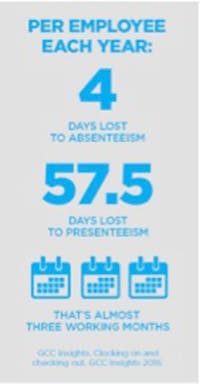Presenteeism Costs Business 10 Times More than Absenteeism
On average, employees cost businesses the equivalent of three months per year in lost productivity, according to a new GCC Insights report by Global Corporate Challenge (GCC).
GCC’s study on presenteeism – the phenomenon where employees show up for work but don’t perform at full capacity – included nearly 2,000 employees and validated against the World Health Organization’s (WHO) Workplace Health and Productivity Questionnaire (HPQ).
The report found that while employees were absent from work an average of four days per year each, they confessed to being unproductive on the job for 57.5 days each – almost three working months. Businesses wanting to improve productivity should focus on reducing presenteeism, notes one of the study authors.
“[T]his study, and a growing body of independent research, indicates that businesses are focused on the wrong measure of productivity; absenteeism is not the major culprit,” says GCC Insight’s data scientist, Dr. Olivia Sackett. “Businesses use absenteeism rates as an indicator of engagement and productivity because it’s easy to quantify. If your employee is at their desk or on the work site, you can tick a box.”
Sackett, in an interview with EHSToday.com, was asked if researchers were surprised by the results. “I was surprised at first,” she says, “but in light of anecdotal evidence, it wasn't all that surprising. Although 57.5 days per year sounds very high, it corresponds to a person working at 75 percent of their maximum productivity level. What did surprise me was that it was so much higher than absenteeism and yet not many people were talking about it.”
She adds that although it is tougher to quantify presenteeism than absenteeism, it is possible to do so using tools, such as the WHO-HPQ used in this study, that are available and have demonstrated validity.
The cost of presenteeism to businesses also was 10 times higher than absenteeism. Absent workers cost employers around USD $150 billion per year, but those who came to work and were not fully productive cost USD $1,500 billion per year.
Dr, David Batman, GCC’s chief medical officer, is a registered consultant specialist in occupational health with expertise in psychological health at work. He said it was time to change the conversation and start prioritizing under-performance over absenteeism.
“We need to stop talking about how many sick days people are taking and focus our energy on what they’re doing when they’re actually at work,” insists Batman.
He stressed that presenteeism was easy to identify; and being more tuned in to the wellbeing of employees was not only good business management, it was good for people too.
“I preach a simple message – pay attention if you notice something has changed,” Batman says. “Employees at all levels of a business may be stressed, distracted and struggling to perform at work. As a result, they may be fatigued and this can affect their concentration. So if employees’ engagement with their job decreases or they seem unconcerned about outcomes, you may have a problem – and you will need to act.”
In an interview with EHSToday.com, Batman points to the financial crisis in 2008 as one of the culprits leading to stressed employees.
“[T]he world of work has become increasingly insecure,” Batman says. “Employees at all levels worry about the uncertainty of their futures and that of their families and increasingly do not know who or what to trust. Disposable income is challenged and it is very hard for many to meet all their financial demands.”
But one of the main issues, he claims, is the stigma around mental illness. Employees do not want to admit to depression, anxiety or other types of mental illness for fear of being seen as a failure or defined by their illness. Such illnesses affect sleep, says Batman, and consequently fatigue, decrease in concentration and memory occur.
Consequently, employees do not want to be absent from work, so they show up “far from full mental and intellectual capacity,” says Batman.
Quick Fixes Work
Data from the report showed that when businesses take a whole-of-person approach to health, it rapidly can transform a workforce suffering from entrenched presenteeism.
“On average, each employee who participated in GCC’s comprehensive health program gained the equivalent of 10 days lost time,” Sackett reveals. “Employees who participated in the GCC reported substantial improvements in sleep, stress levels and overall happiness at the end of the program.”
Since the changes were associated with improvements in their productivity, those employees who participated in the GCC not only were generally happier and more relaxed, they also were markedly more productive than they were before, she adds.“Employees were spending more of the time they were at work actually working – and they were enjoying it more,” says Sackett. “This is something that every business needs in order to be competitive.”
Batman says he “totally and unreservedly” agrees that the results of this study and others make a compelling case for treating employees holistically. Workplace safety and health no longer is just about sending workers home with all of their fingers and toes. More and more it seems, it’s about protecting them physically and also about supporting them mentally by keeping them healthy and engaged.
“We are human beings with increasing personal, health, financial and family pressures,” notes Batman. “It can happen to us all. Recognizing there may be a problem both from the employee and business position will help. Being open to the problem and recognizing responsibilities from both employee and business perspective will help.”
Batman suggests companies need a business culture where employees are not penalized for reporting health and personal issues affecting their performance. Employers need to recognize that these issues affect not only the employees reporting it, but also the co-workers who are impacted by their presenteeism.
“Everyone at some time hides behind their ‘public face’ and behind it is a ‘private face’ screaming for help,” says Batman. “It will affect us all at some point in our lives and we need to be open with ourselves, family, friends and co-workers when we are struggling and we need to feel confident we can approach our manager and human resources department for support.”
About the Author
Sandy Smith
Editor-in-Chief
Sandy Smith is editor-in-chief of EHS Today, a Penton publication. She has been writing about occupational safety and health and environmental issues since 1990. She has been interviewed about occupational safety and health for documentaries and television programs, has served as a panelist on roundtables, has provided the keynote address for occupational safety and health conferences and has won national and international awards for her articles.




